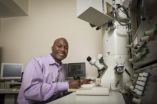(Press-News.org) STANFORD, Calif. — As many as 10 percent of women with a personal or family history of breast or ovarian cancer have at least one genetic mutation that, if known, would prompt their doctors to recommend changes in their care, according to a new study by researchers at the Stanford University School of Medicine.
The women in the study did not have mutations in BRCA1 or BRCA2 (mutations in these genes are strongly associated with hereditary breast and ovarian cancer), but they did have mutations in other cancer-associated genes.
The study was conducted using what's known as a multiple-gene panel to quickly and cheaply sequence just a few possible genetic culprits selected by researchers based on what is known about a disease. Although such panels are becoming widely clinically available, it's not been clear whether their use can help patients or affect medical recommendations.
"Although whole-genome sequencing can clearly be useful under the right conditions, it may be premature to consider doing on everyone," said James Ford, MD, who directs Stanford's Clinical Cancer Genetics Program. "Gene panels offer a middle ground between sequencing just a single gene like BRCA1 that we are certain is involved in disease risk, and sequencing every gene in the genome. It's a focused approach that should allow us to capture the most relevant information."
Ford, an associate professor of medicine and of genetics, is the senior author of the study, which will be published April 14 in the Journal of Clinical Oncology. Allison Kurian, MD, assistant professor of medicine and of health research and policy, and associate director of the Clinical Cancer Genetics Program, is the study's lead author.
Ford was a co-author on a recent paper in the in The Journal of the American Medical Association that highlighted the challenges and opportunities of making whole-genome sequencing clinically available for seemingly healthy people. Although that study showed that whole-genome sequencing can be potentially life-saving, the challenges involved in sequencing the billions of nucleotides that make up all of a person's DNA, and then translating the results into clinical care recommendations, is significant.
"This study indicates that using gene panels to screen for potentially harmful variants can be clinically useful in certain groups of patients," said Kurian. "It also shows that patients, some of whom had given blood samples for research as many as 10 years earlier, are willing and interested to receive this type of follow-up information and to incorporate it into their health care plans."
Gene panels allow researchers to learn the sequences of several genes simultaneously from a single blood sample. It stands to reason that screening for mutations in just a few select genes is quicker, easier and cheaper than whole-genome sequencing. The technique usually focuses on fewer than 100 of the approximately 21,000 human genes. But until now, few studies have investigated whether homing in on a pre-determined panel of suspects can actually help people.
In the study, Kurian and Ford assessed the sequences of 42 genes known to be associated with the development of breast or other cancers, or involved in DNA repair pathways that nip potentially dangerous mutations in the bud. Blood samples in the study came from 198 women who underwent BRCA1 and BRCA2 testing at the Stanford Clinical Cancer Genetics Program between 2002 and 2012. At the time of the testing, the women were asked if they would like to donate an additional blood sample for future research.
Of the 198 women, 57 carried BRCA1/2 mutations. Ford and Kurian found that 14 of the 141 women without a BRCA1/2 mutation had clinically actionable mutations in one of the 42 genes assessed by the panel. (An actionable mutation is a genetic variation correlated strongly enough to an increase in risk that clinicians would recommend a change in routine care — such as increased screening — for carriers.)
Eleven of the 14 women were reachable by telephone, and 10 accepted a follow-up appointment with a genetic counselor and an oncologist to discuss the new findings. The family members of one woman, who had died since giving her blood sample, also accepted counseling. Six participants were advised to schedule annual breast MRIs, and six were advised to have regular screens for gastrointestinal cancers; many patients received more than one new recommendation.
One woman, with a history of both breast and endometrial cancer, learned she had a mutation that causes Lynch syndrome, a condition that increases the risk of many types of cancers. As a result, she had her ovaries removed and underwent a colonoscopy, which identified an early precancerous polyp for removal.
"An important question about the use of these gene panels is whether they can allow us to provide additional genetic guidance and screening," Kurian said. "We found that the participants were interested and willing to receive the additional information, and they were generally pleased at the results, which helped them make decisions about their clinical care."
Screening with gene panels does not, however, eliminate the problem of variants of uncertain significance. This term is used when a gene sequence deviates from the consensus, but the clinical effect of that change is unknown. Each of the 141 women in the study had about two variants of uncertain significance in the 42 genes studied.
"This problem is shared with whole-genome sequencing," Ford said, "and should subside as we gather ever more data on the effect of specific mutations in these genes." The National Institutes of Health-sponsored Clinical Genome Resource, or ClinGen, was created to speed the identification and aid in the interpretation of clinically important variants.
Yet even though the study shows that gene panels can be useful in some groups, it may be some time before they could be routinely used in the general population, the researchers said.
"It's a slippery slope at the moment," Ford said. "We need to know how prevalent these cancer-associated mutations are in the general population. We also need to be aware that, at least for a while, it's very likely that every person will harbor one or more variants of uncertain significance. Is that information that a person would want to know? Is it helpful? In 10 years, this is likely to change as we learn more about the clinical significance of these changes."
INFORMATION:
Other Stanford co-authors are genetic counseling program manager Meredith Mills; genetic counselor Kerry Kingham; research associate Lisa McPherson, PhD; professor of health research and policy Alice Whittemore, PhD; senior research scientist Valerie McGuire, PhD; and associate professor of medicine Uri Ladabaum, MD. Researchers from the San Francisco-based Invitae Corp., a genetic-testing company, were also co-authors. Invitae sequenced the genes in the study and helped to fund the study. Additional funding came from the Breast Cancer Research Foundation, a Stanford University Cancer Institute Developmental Research Award in Population Sciences, the Jan Weimer Junior Faculty Chair in Breast Oncology at Stanford and the National Institutes of Health (RR025744).
The Stanford University School of Medicine consistently ranks among the nation's top medical schools, integrating research, medical education, patient care and community service. For more news about the school, please visit http://mednews.stanford.edu. The medical school is part of Stanford Medicine, which includes Stanford Hospital & Clinics and Lucile Packard Children's Hospital Stanford. For information about all three, please visit http://stanfordmedicine.org/about/news.html.
Print media contact: Krista Conger at (650) 725-5371 (kristac@stanford.edu)
Broadcast media contact: M.A. Malone at (650) 723-6912 (mamalone@stanford.edu)
Gene panels may be useful, cheaper alternative to whole-genome sequencing, study finds
2014-04-14
ELSE PRESS RELEASES FROM THIS DATE:
Collaborative care model manages depression, anxiety in patients with heart disease
2014-04-14
Bottom Line: A telephone-based collaborative care model helped manage depression and anxiety, and improved health-related quality of life in patients with heart disease.
Author: Jeff C. Huffman, M.D., of Massachusetts General Hospital, Boston, and colleagues.
Background: Depression following acute cardiac conditions is common and generalized anxiety and panic disorders occur at higher rates in patients with heart conditions. Depression and anxiety are determinants of health-related quality of life (HRQoL). Collaborative care (CC) models use nonphysician care managers ...
Nano shake-up
2014-04-14
Significant advances have been made in chemotherapy over the past decade, but targeting drugs to cancer cells while avoiding healthy tissues continues to be a major challenge.
Nanotechnology has unlocked new pathways for targeted drug delivery, including the use of nanocarriers, or capsules, that can transport cargoes of small-molecule therapeutics to specific locations in the body.
The catch? These carriers are tiny, and it matters just how tiny they are. Change the size from 10 nanometers to 100 nanometers, and the drugs can end up in the wrong cells or organs and ...
Study says we're over the hill at 24
2014-04-14
It's a hard pill to swallow, but if you're over 24 years of age you've already reached your peak in terms of your cognitive motor performance, according to a new Simon Fraser University study.
SFU's Joe Thompson, a psychology doctoral student, associate professor Mark Blair, Thompson's thesis supervisor, and Andrew Henrey, a statistics and actuarial science doctoral student, deliver the news in a just-published PLOS ONE Journal paper.
In one of the first social science experiments to rest on big data, the trio investigates when we start to experience an age-related ...
Lashing out at your spouse? Check your blood sugar
2014-04-14
COLUMBUS, Ohio – Lower levels of blood sugar may make married people angrier at their spouses and even more likely to lash out aggressively, new research reveals.
In a 21-day study, researchers found that levels of blood glucose in married people, measured each night, predicted how angry they would be with their spouse that evening.
At the end of the 21 days, people who had generally lower levels of glucose were willing to blast their spouses with unpleasant noises at a higher volume and for a longer time than those who had higher glucose levels.
The study shows how ...
Ferns borrowed genes to flourish in low light
2014-04-14
DURHAM, N.C. -- During the age of the dinosaurs, the arrival of flowering plants as competitors could have spelled doom for the ancient fern lineage. Instead, ferns diversified and flourished under the new canopy -- using a mysterious gene that helped them adapt to low-light environments.
A team led by Duke University scientists has pinpointed the curious origins of this gene and determined that it was transferred to ferns from a group of unassuming moss-like plants called hornworts. The findings were announced today, April 14, in the Proceedings of the National Academy ...
Plugging an ozone hole
2014-04-14
CAMBRIDGE, Mass-- Since the discovery of the Antarctic ozone hole, scientists, policymakers, and the public have wondered whether we might someday see a similarly extreme depletion of ozone over the Arctic.
But a new MIT study finds some cause for optimism: Ozone levels in the Arctic haven't yet sunk to the extreme lows seen in Antarctica, in part because international efforts to limit ozone-depleting chemicals have been successful.
"While there is certainly some depletion of Arctic ozone, the extremes of Antarctica so far are very different from what we find in the ...
Fire and drought may push Amazonian forests beyond tipping point
2014-04-14
Falmouth, Mass. – Future simulations of climate in the Amazon suggest a longer dry season leading to more drought and fires. Woods Hole Research Center scientists Michael Coe, Paulo Brando, Marcia Macedo and colleagues have published a new study on the impacts of fire and drought on Amazon tree mortality. Their paper entitled “Abrupt increases in Amazonian tree mortality due to drought-fire interactions,” published in the Proceedings of the National Academy of Sciences, found that prolonged droughts caused more intense and widespread wildfires, which consumed more forests ...
Faithful allies since the Cretaceous
2014-04-14
Like humans, many animals depend on beneficial microbes for survival. Although such symbioses can persist for millions of years, the factors maintaining their long-term stability remain, in most cases, unknown. Scientists from the Max Planck Institute for Chemical Ecology and the University of Regensburg, in collaboration with researchers in the USA, now discovered that certain wasps tightly control mother-to-offspring transmission of their bacterial symbionts. This stabilizes the symbiotic alliance and contributed to its persistence over the past 68-110 million years. ...
'Problem wells' source of greenhouse gas at unexpected stage of natural gas production
2014-04-14
WEST LAFAYETTE, Ind. - High levels of the greenhouse gas methane were found above shale gas wells at a production point not thought to be an important emissions source, according to a study jointly led by Purdue and Cornell universities. The findings could have implications for the evaluation of the environmental impacts from natural gas production.
The study, which is one of only a few to use a so-called "top down" approach that measures methane gas levels in the air above wells, identified seven individual well pads with high emission levels and established their stage ...
Penicillin redux: Rearming proven warriors for the 21st century
2014-04-14
Penicillin, one of the scientific marvels of the 20th century, is currently losing a lot of battles it once won against bacterial infections. But scientists at the University of South Carolina have just reported a new approach to restoring its combat effectiveness, even against so-called "superbugs."
Bacteria have been chipping away at the power of the penicillin family of drugs since their first wide-scale use as antibiotics in the 1940s. For example, the staph infection, brought about by the bacterium Staphylococcus aureus, was once readily treated with penicillin and ...





